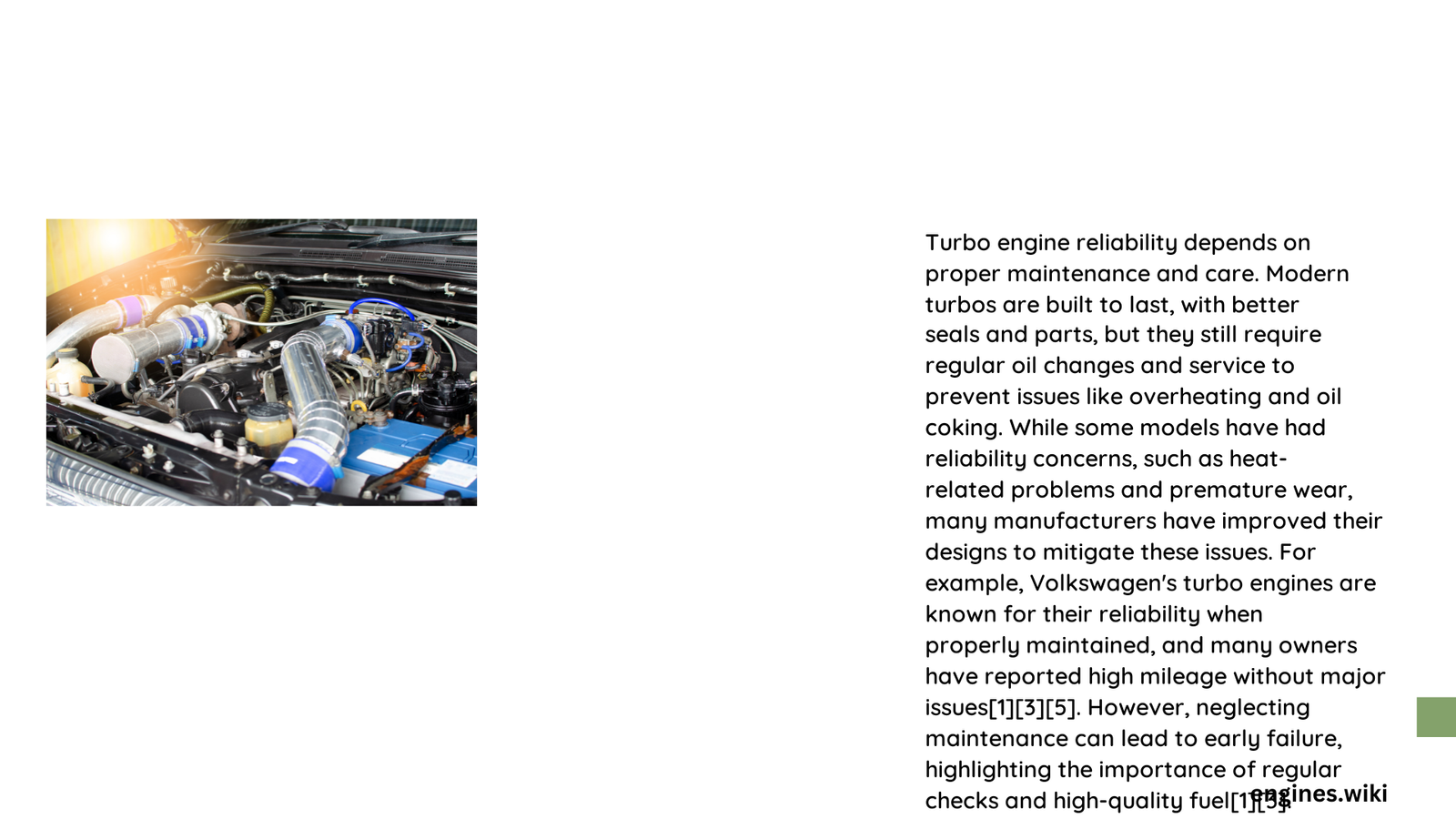Turbocharged engines represent a complex technological marvel balancing power and efficiency, yet their reliability remains a critical concern for automotive enthusiasts and vehicle owners. Modern turbocharged engines experience nuanced performance challenges, with failure rates varying between 5-15% depending on manufacturer, maintenance practices, and driving conditions. Understanding these intricate dynamics requires a comprehensive exploration of mechanical stress, technological innovations, and proactive maintenance strategies.
What Determines Turbo Engine Reliability?
Performance Stress Factors
Turbocharged engines encounter unique reliability challenges stemming from multiple interconnected factors:
| Stress Factor | Impact Level | Potential Consequences |
|---|---|---|
| Heat Generation | High | Accelerated Component Wear |
| Pressure Dynamics | Medium-High | Potential Seal Degradation |
| Oil System Complexity | Medium | Lubrication Performance Risks |
Key Mechanical Vulnerabilities
- Turbocharger Component Integrity
- Precision-engineered rotating assemblies
- Susceptible to high-temperature performance degradation
-
Requires meticulous lubrication management
-
Thermal Expansion Challenges
- Rapid temperature fluctuations
- Potential micro-fracture development
- Critical material stress points
How Often Do Turbo Engines Fail?
Failure rates demonstrate significant variability:
- Average Failure Probability: 7-12% within first 100,000 miles
- Manufacturer Dependent: Some brands exhibit lower failure rates
- Maintenance Critical: Proper care reduces failure likelihood by 60-70%
What Maintenance Prevents Turbo Engine Failures?
Recommended Maintenance Protocols
- Oil Quality Management
- Use synthetic high-performance lubricants
- Change oil at recommended intervals
-
Monitor oil viscosity and contamination levels
-
Cooling System Optimization
- Regular coolant system inspections
- Maintain proper fluid levels
- Check radiator and heat exchanger efficiency
Can Driving Habits Impact Turbo Engine Reliability?
Driving behaviors significantly influence long-term performance:
- Aggressive Acceleration: Increases mechanical stress
- Extended Idle Periods: Reduces turbocharger efficiency
- Cold Start Practices: Critical for initial lubrication
What Are Replacement Costs?
Turbocharger Replacement Estimates:
– Basic Models: $1,000 – $2,000
– High-Performance Vehicles: $3,000 – $5,000
– Labor Costs: Additional $500 – $1,500
Technical Recommendations
- Implement strict oil change schedules
- Use manufacturer-recommended lubricants
- Avoid prolonged high-stress driving conditions
- Perform regular diagnostic assessments
Advanced Diagnostic Strategies
- Computerized Engine Monitoring
- Thermal Imaging Inspections
- Vibration Analysis Techniques
Future Technology Outlook
Emerging technologies promise enhanced turbo engine reliability:
– Advanced ceramic turbocharger components
– Predictive maintenance algorithms
– Enhanced material science innovations
Pro Tip: Always consult manufacturer-specific guidelines for precise maintenance recommendations.
Expert Insights
Automotive engineers consistently emphasize that proactive maintenance represents the most critical factor in turbo engine longevity. Understanding individual vehicle characteristics and implementing targeted care strategies can dramatically extend operational performance.
Reference:
– SAE International Reliability Studies
– Consumer Reports Automotive Research
– Society of Automotive Engineers Publications

